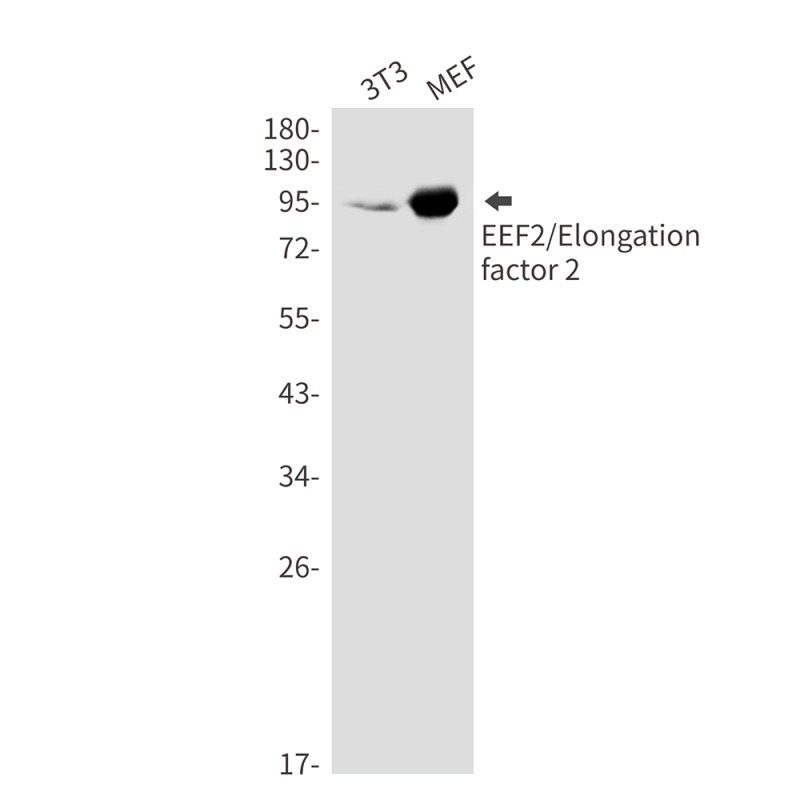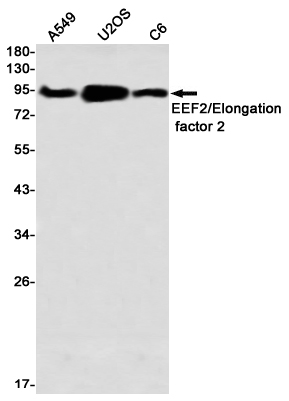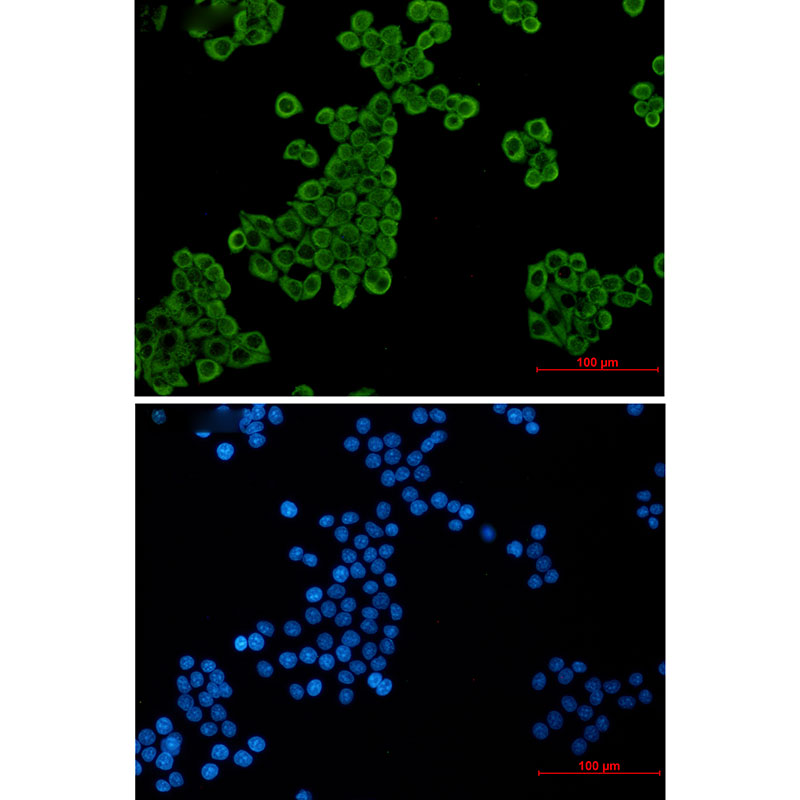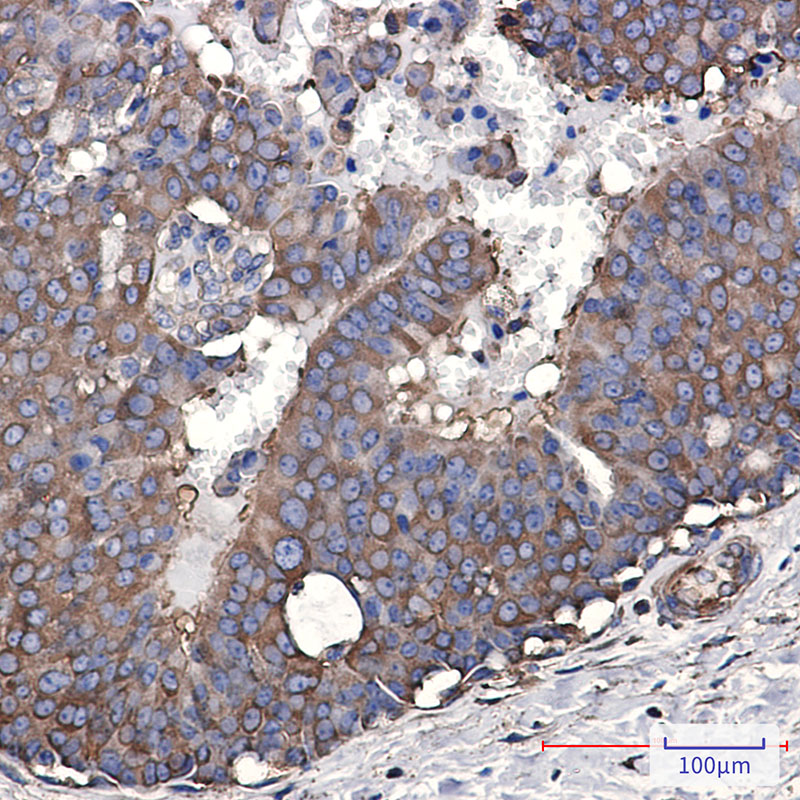



| WB | 1/500-1/1000 | Human,Mouse,Rat |
| IF | 1/20 | Human,Mouse,Rat |
| IHC | 1/50-1/100 | Human,Mouse,Rat |
| ICC | 1/50-1/200 | Human,Mouse,Rat |
| FCM | 咨询技术 | Human,Mouse,Rat |
| Elisa | 咨询技术 | Human,Mouse,Rat |
| Aliases | EEF2; EF2; Elongation factor 2; EF-2 |
| Entrez GeneID | 1938 |
| WB Predicted band size | Calculated MW: 95 kDa; Observed MW: 95 kDa |
| Host/Isotype | Rabbit IgG |
| Antibody Type | Primary antibody |
| Storage | Store at 4°C short term. Aliquot and store at -20°C long term. Avoid freeze/thaw cycles. |
| Species Reactivity | Human,Mouse,Rat |
| Immunogen | A synthetic peptide of human EEF2/Elongation factor 2 |
| Formulation | Purified antibody in TBS with 0.05% sodium azide,0.05%BSA and 50% glycerol. |
+ +
以下是3-4条关于 **Elongation Factor 2 (EF2)** 抗体的参考文献及其简要摘要内容:
---
1. **文献名称**: *"Phosphorylation of elongation factor 2 by EF-2 kinase affects rate of translation"*
**作者**: Ryazanov AG, Shestakova TP, Natapov PG
**摘要**: 该研究阐明了EF2激酶(eEF2K)通过磷酸化EF2调控其活性的机制,并利用EF2抗体检测了磷酸化状态对核糖体翻译速率的影响。
---
2. **文献名称**: *"Elongation factor 2 phosphorylation and the regulation of protein synthesis by calcium"*
**作者**: Nairn AC, Palfrey HC
**摘要**: 通过EF2特异性抗体,研究发现细胞内钙离子信号通过激活eEF2K诱导EF2磷酸化,进而抑制翻译延伸,揭示了钙依赖性翻译调控的分子机制。
---
3. **文献名称**: *"Targeting elongation factor 2 kinase enhances the efficacy of proteasome inhibitors in multiple myeloma"*
**作者**: Moreno JA, et al.
**摘要**: 利用EF2抗体分析多发性骨髓瘤细胞中EF2的表达及磷酸化水平,发现抑制eEF2K可增强蛋白酶体抑制剂的抗肿瘤效果,为临床治疗提供新策略。
---
4. **文献名称**: *"Regulation of eukaryotic elongation factor 2 by phosphorylation: a key mechanism in cellular stress responses"*
**作者**: Browne GJ, Proud CG
**摘要**: 通过Western blot和免疫沉淀技术(使用EF2抗体),系统总结了EF2磷酸化在细胞应激(如缺氧、营养剥夺)中的核心作用及其对全局翻译的调控。
---
这些文献涵盖了EF2的磷酸化调控、功能机制及在疾病中的应用研究,均通过EF2抗体进行实验验证。如需具体文献来源(期刊、年份),可进一步补充。
Elongation factor 2 (EF-2) is a critical protein in eukaryotic translation, responsible for catalyzing the GTP-dependent translocation of transfer RNA (tRNA) and messenger RNA (mRNA) through the ribosome during the elongation phase of protein synthesis. It is highly conserved across species and plays an essential role in cellular protein production. EF-2 activity is tightly regulated by post-translational modifications, particularly phosphorylation at Thr56/Thr58 by EF-2 kinase (eEF2K), which inhibits its ribosome-binding ability and slows translation elongation under stress conditions. Another key modification is ADP-ribosylation by bacterial toxins (e.g., diphtheria toxin), which completely blocks its function.
Antibodies targeting EF-2 are widely used in research to study its expression, localization, and regulatory modifications in various biological contexts. These tools help investigate EF-2's involvement in diseases such as cancer, where dysregulated translation elongation contributes to tumor progression, or neurodegenerative disorders linked to impaired protein synthesis. EF-2 antibodies are commonly employed in techniques like Western blotting, immunofluorescence, and immunoprecipitation to assess protein levels, phosphorylation status, or interaction partners. Some antibodies specifically recognize modified forms (e.g., phosphorylated EF-2), enabling studies of cellular stress responses or metabolic adaptations. As a housekeeping protein, EF-2 also serves as a loading control in experiments, though its regulation under specific conditions requires careful interpretation.
×